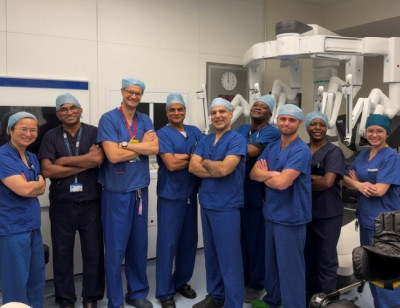
The robot allows surgeons to make much more precise movements so patients can undergo less invasive surgery, which means patients can recover sooner and are less likely to contract an infection. The robot also delivers highly magnified, 3D high-definition views of the surgical area, which along with the instrument articulation, makes it possible for surgeons to perform highly complex procedures through a few small incisions.
At the Royal Free Hospital (RFH), robotic surgery has already been in use for patients needing kidney and bowel operations. But this month it has used to perform liver and gall bladder surgery for the first time.
Dinesh Sharma, consultant liver transplant and HPB surgeon, led on the first robot-assisted at the RFH surgeries, assisted by a team of theatre staff, as well as consultant colleague Satheesh Iype.
Dinesh said: “We know that patients want access to the latest technology and are excited about the benefits it brings, such as being able to return to work sooner and reduced scarring. Robotic surgery also helps us recruit, develop and retain the best talent.”
“Being able to offer robotic surgery to our HPB patients is really good news and we hope many more will benefit from this approach going forward as the service expands.”
The Da Vinci robot has been in use at the Royal Free Hospital since 2016 and has primarily been used to treat patients with kidney cancer. The Royal Free Hospital is the largest robotic renal centre in Europe.
(Pictured: staff from the HPB robotic surgery team)
 Translate
Translate